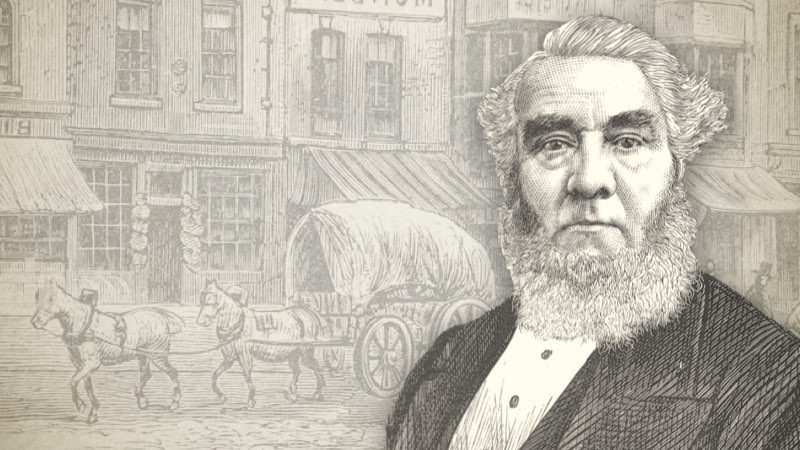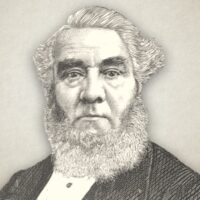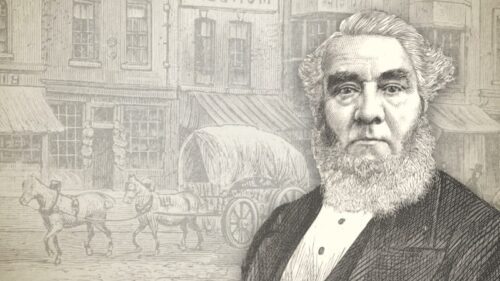
The Life And Ministry Of Thomas Stringer
Earthen Vessel 1879:
Mr. Thomas Stringer, Minister Of Trinity Chapel, Borough.
“Since Christ is the Captain and Friend,
The Directory! The Pilot! The Guide!
Sure We shall hold out to the end,
In spite of temptation’s strong tide.”
Since the photographic likeness of our friend, Mr. Thomas Stringer, appeared in our January issue, we have received the thanks of many of the Lord’s people in different parts—all expressing a hope that a full review of his up-rising, and of his progress in the ministry, would be given in the pages of the Earthen Vessel. This cannot be done in one number. It is a life full of narratives; and although we shall not attempt to furnish any consecutive history of this good and gracious minister, still there are some striking appearances of the hand of the Lord being favourable toward him that (simply to magnify the grace of God) we wish to give in a few brief chapters.
Mr. Thomas Stringer is a man and a minister by himself. We have known multitudes of good and faithful ministers, but, for some things, we never did know any man at all like unto the present minister of Trinity chapel, in Southwark.
We saw the late Mr. James Wells baptize Mr. Stringer in East-lane chapel, on the 20th of May, 1844; and when James was fairly in the water with Thomas, James cried out, “Nature has given me a pair of long arms, and when I get any in the water, I take good care that they go right under!” If nature had given James Wells a pair of long arms, what has nature given to Thomas Stringer? A body of large compass, and compact in every part, a head nobly and well mounted, a constitution of immense strength, a voice like a bell, and a tongue of almost unparalleled fluency. This personal appearance, this tenor-like voice, this rapid and ever-ready door of utterance, this frontispiece so fine, and this fountain of language so fluent and free, the Lord commanded nature to give him, that he might be as a bold trumpeter in the front of King Immanuel’s army, in these days of insidious declension from the revelation which God hath given unto us by the ever-blessed Spirit—the Holy Ghost—the Comforter.
The qualifications of nature, however beautiful and useful, yea, essentially necessary as they are to a public man, would be of no use to the living family of God if grace had not wrought within him that which the Spirit of God declares to be indispensable, when (in Ps. 51).
He saith, “Behold, thou desirest truth in the inward parts; and in the hidden part Thou shalt make me to know wisdom.” “Truth in the inward parts” means a new and a Christ-loving heart, a conscience purged from dead works, to serve the living and the true God; a soul filled with the life and fire of the Divine Paraclete; a mind with all the invigorating springs of mental and of deeply meditating powers; hence, our friend Thomas Stringer is not merely a rapid talker, he is a thinker, a reader, a man of prayer, with a poetic spirit; a man (as Burkett puts it) of unbending resolutions, of daring courage, with a long-standing character of morality, integrity, and of honesty to his God, to himself, and all with whom he may have to do. Not a perfect man, only as he stands justified and accepted in the Person of the ever-glorious Redeemer, High Priest, and Advocate, before the throne of God; but a man honoured of his God, and beloved by thousands of the faithful.
It is more than thirty years since we heard Mr. Stringer preach an anniversary sermon from the words, “A man in whom the Spirit of God is; “and in that discourse, at that early part of his ministry, we saw he had a strong mind to search after Biblical knowledge, a strong love for Divine unfoldings of the sacred mysteries of grace, a strong memory to retain, and to exhibit those mysterious mercies, and a most powerful voice to make the people hear all he had to say. From that day until the present time he has been a faithful witness to the truth, and a willing worker in the Churches of Christ all the land over.
We cannot conclude this introductory notice without adding that the distinction and definition given by a converted lady, exactly expresses the even tenor of Mr. Stringer’s general style of preaching. Mr. Ramsey, in The Christian Signal, says,—
“In the startling yet suggestive phrase, “Jesus & Co.,” a Roman Catholic lady summed up the system of image worship and priestcraft, which, under the influence of Divine grace she openly renounced for “the simplicity that is in Christ.”
On a visit with some Protestant friends, in the East of London, she volunteered, one Sunday morning, to attend the Christian sanctuary which they were accustomed to frequent.
Her mind was evidently in an inquiring mood, and for some time previously had been ill at ease concerning certain matters of faith.
Now, the Spirit of truth enlightened the eyes of her understanding, and opened her heart to receive “the truth as it is in Jesus.”
The preacher chose for his text the two sweet words “Jesus only,” and having invited attention to the scene on the Mount of Transfiguration—Divine glory enveloping the despised Man of sorrows, Moses and Elias rendering Him homage, and a voice from heaven testifying to His Messiahship—claimed for “Jesus only” as Saviour, the whole thought, and trust, and love, and devotion, of all His avowed disciples. Human righteousness was shown to be faulty and worthless as a ground of justification before God. Pious feelings, good works, bodily sufferings, were demonstrated equally void of merit, and utterly vain as a foundation for the sinner’s hope. “Christ Jesus, whom God hath set forth to be a propitiation through faith in His blood,” was declared the only righteousness of the ungodly; and the Apostle Peter’s testimony to the sovereign power of “The name of Jesus Christ of Nazareth,” was cited as the essence of the discourse. “Neither is there salvation in any other: for there is none other name under: heaven given among men, whereby we must be saved.”
At the close of the service there was a knock at the vestry door, and two ladies entered, one of whom appeared to be labouring under deep emotion.
Her countenance was flushed with joy while bathed in tears. Grasping the preacher’s hand in her’s, she exclaimed, “O, sir, I see it all now—it must be ‘Jesus only,’ for Saviour! How miserably I have been deceived. I have been putting many things into partnership with Jesus Christ—my works, my prayers, the Virgin Mary, the saints, the priests, the sacraments. I have been trusting for salvation in Jesus and Co., and the way of peace I have not known until now. Henceforth ‘Jesus only’ shall be my hope. No other creature in heaven or earth shall usurp His place in my heart. No more human mediators for me—not Jesus and Co., but ‘Jesus only!’ No more compounding of my own worthless merits with His precious righteousness—too long it has been Jesus and Co.; now it shall be ‘Jesus only!’ O, how happy I feel in the knowledge that He is able to save to the uttermost!’ I want no other Saviour. I have done for ever with the ‘Co.’ My heart shall cleave to ‘Jesus only!’”
Within the walls of that vestry, no gladder scene was ever witnessed by men or angels. No fuller confession of Jesus Christ was ever uttered by mortal lips. After listening to words of encouragement and counsel, she departed homewards with her friend, the Virgin Mary’s song echoing in her experience, “My soul doth magnify the Lord, and my spirit doth rejoice in God my Saviour.”
Are there not many nominal Christians who have no sympathy with the flagrant errors of Popery, and yet are fundamentally wrong in the matter of their hope of salvation? Our Lord Jesus Christ is formally avowed as Saviour, but they do not trust solely in Him. They link with His propitiation for sins, their own obedience, their prayers, virtues, charities, and sacrifices of self, supposing that thus there is laid a meritorious ground on which to build securely for eternity. The creed of their heart and life is really Jesus and Co.!
Take heed, lest you fall into this snare of Satan. Nothing is more dishonouring to the Saviour, and more perilous to the sinner, than an attempt to supplement with human righteousness the all-sufficient propitiation—the :finished work of Christ.
To that “Foundation” which God has laid in Zion, you need not vainly add the “wood, hay, stubble” of your works to make a firm basis for faith. “Other foundation can no man lay than that is laid, which is Jesus Christ.”
“I stand upon His merit—
I know no other stand—
Not e’en where glory dwelleth,
In Immanuel’s land!”
I once heard an Irish-speaking missionary translate from the New Testament in his own language that beautiful text (Heb. 7:25) which was such a help to the Roman Catholic lady, “Wherefore He is able also to save them to the uttermost that come unto God by Him;” and in the simple idiom of his mother tongue he read it thus, “Wherefore He is able also to save them more than enough.” Yes, Jesus is able to save: He is able, more than enough, to save. Trust Him fully; trust Him only. Do not attempt to link any “Co.” with Jesus. Let your life-song be “Jesus only!” “Jesus only” for justification. “Jesus only” for sanctification. “Jesus only” for refuge. “Jesus only” for hope. “Jesus only” for heaven!
Written in your inmost soul be the motto sent to his bride by that illustrious scholar Bengel:—
“Jesus in Heaven,
Jesus in the heart,
Heaven in the heart,
The heart in heaven.”
“All successful reformers,” says Dean Milman in his “History of Latin Christianity,” “have been Calvinists; Calvinists in spirit, with a conviction that God had set them apart for some special work, and that they must not rest until, through them, God had completed His purpose.”
This was the spirit that Paul had when he wrote his epistle to the Galatians, showing them the Divine source of his commission; that it was not from man, nor of man; but of God. He could boldly exclaim, “Knowing that I am set for the defence of the Gospel;” and “Woe is me if I do not preach it.”
No one can fairly review the whole life of our bold contender for the faith “Once (for all) delivered unto the saints “—Thomas Stringer the pastor of the Church in Trinity Chapel, Borough—but must conclude that, in the great predestinating purpose of Almighty God, it was determined that he should be, in this generation, a firm, a fervent, a successful, and a long-standing witness of the true Gospel of the grace of God.
Scarcely can there be any greater difficulty in all Christendom, in these times, than to find a genuine, a Christ-ordained, a Spirit- anointed minister of the Gospel. The universities, the colleges, the academies, the schools, and the different societies manufacture, train, and qualify, as far as they can, such multitudes of men for the ministry that they overflow the demand most amazingly. We admit, some of the brightest stars that ever shone in the Protestant Churches came forth from the universities; therefore, we cast no unkind reflection upon them. From the colleges and schools have proceeded many highly-gifted and devoted pastors. In fact, the days have fallen upon as when, if a minister is not sent forth by some duly-recognised college, he is, to a large extent, looked down upon, by the well-educated generations springing up around us, with contempt. Nevertheless, it is not for us to enter any protest against collegiate training.
We are not fearful that there will ever be too many faithful ministers of Christ. Neither stand we in jeopardy every hour lest the elect and redeemed family of God should be finally deceived. Our grief springs from the character of the so-called worship which is patronised in almost the whole of our churches, tabernacles, and chapels now, where “Christ’s Gospel’’ is either ignored or so adulterated that deep delusions possess the minds of the people; and, as regards the way, the work, the witness, and the perfection of Heaven’s salvation, they remain in darkness still; the attracted choirs, the musical concerts, and the splendid singing, carrying the people off into natural ecstacies, rocking them off in dreams of sensational pleasure, which they take to be “the joys of salvation.”
“But we forbear; long flights forbode a fall;
Strive on the deep-toned chord the sum of all;
Hear the just law, the judgment of the skies;
He that hates truth shall be the dupe of lies;
And he that will be cheated to the last,
Delusions, strong as hell, shall bind him fast.”
O, awful work! sending souls to hell, while you smilingly tell them it is the way to God’s glory. This is, beyond all imagination, vile hypocrisy indeed.
In a few brief papers on the life of Mr. Thomas Stringer, we may take occasion to refer to the present heterogeneous shades and dissimilarities of the ministry. It has been a perpetually painful study with us during the last fifty years, more or less; and of the lives of good, of bad, and of divers kinds of ministers, we have heaps and hordes—enough to break one’s heart; only, having been so many times rent in twain, it almost refuseth to break any more. God have mercy upon us, and upon all the poor preachers now scattered abroad upon the earth; for we know of no men more terribly tempted and tried than are the living, the loving, the faithful followers of the now glorified “High Priest of our profession.”
Thomas Stringer (like George Whitefield) was a publican’s son, at Orpington, in Kent, where Thomas was born and christened considerably over sixty years ago. No doubt, some day, a full biographical history of this good man will be given to the Churches, and that remarkable “DIARY,” which, we understand, is carefully “posted up” every day, containing observations of varied and of valuable interest to the generations yet to come. We have heard it hinted that this voluminous diary will never see broad daylight until our esteemed brother, Thomas Stringer, is safe at home in “Our Father’s house on high.”
As Thomas will, doubtless, live many years after us, we can have no hope of ever reading the aforesaid diary. We must, therefore, be content with such scraps as we can gather up! If life, health, and opportunities are given to us, we shall follow him from Orpington to London, to Snows Fields, to Gravesend, to Brighton, to Manchester, to Plymouth, to Stepney, to Earl Street; right up to his present substantial, commodious, well-appointed, and centralised Baptist Cathedral in Trinity Street, in the Borough, where he is surrounded by more places and peoples who profess faith in the adorable Trinity than in any other of the suburban surroundings of this rapidly-overgrowing metropolis.
For our May Vessel, so much current information is flowing in that we must pause, only observing, if we had been consulted as to who should supply C. H. Spurgeon’s pulpit during his serious affliction, we should have advised him to let Thomas Stringer stand on that platform for at least one Lord’s-day, which would only be a practical fulfilling of the Master’s version of the law, “Thou shalt love thy neighbour as thyself.”—Hush, for the present!
C. W. Banks
Banbury Road, South Hackney.
Thomas Stringer (1809-1887) was a Strict and Particular Baptist preacher. In 1877, he was appointed pastor of Trinity Chapel, Borough. This came at the tail-end of a long and blessed ministry among the Strict Baptist churches, fifty-four years total.




